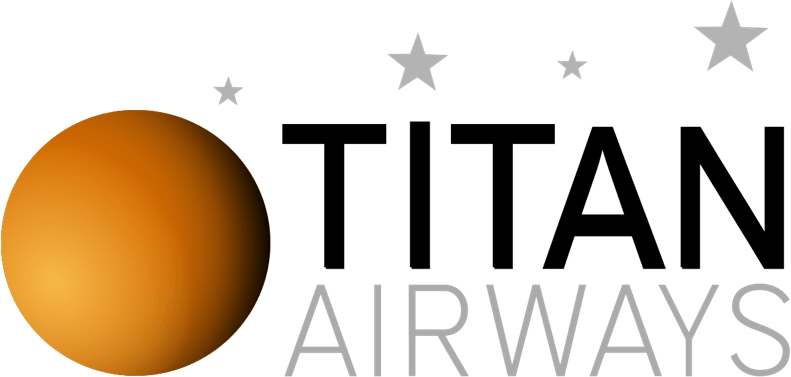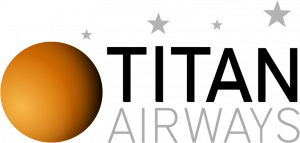Titan Airways’ aim is to ensure its business and activities contribute positively to society.
Introduction
As an SME, we aim to play our part in being a good corporate citizen that contributes in the areas of local initiatives, environmental responsibility, and employee care. The policies contained in this document are supported and promoted by our Board of Directors and reviewed on a regular basis.
Who we are
We are a privately owned charter airline. Established in 1988, we operate a fleet of modern passenger and freight aircraft on charter operations throughout the world. We support other airlines providing aircraft and crew at short notice to ensure continued operations for those airlines. In addition, we operate charters for corporations, sports teams and governments (including humanitarian missions).
We employ a workforce that, while seasonally variable, provides employment for up to 400 people throughout the year. The workforce comprises both those from the local economy, but also eligible workers from throughout the European Union and beyond.
Key corporate responsibility impacts
The key areas that we believe we have direct responsibility for contributing positively to are as follows:
- supporting the local economy
- environment
- noise
- recycling
- education
- environment
Climate change
We follow the continued climate change debate with interest and understand that the operation of aircraft is a contributory factor in this area. We continue to look for ways of ensuring our operation reduces its effect on the environment. Current issues are shown below.
Fleet age and renewal
Our Board is committed to ongoing fleet modernisation with the introduction of more modern, fuel-efficient and quieter aircraft.
In 2023 we met our sustainability commitment of phasing out older aircraft and becoming an all-Airbus operator. In accomplishing this objective, we now operate a more modern and environmentally friendly fleet. The average age of our mixed fleet is 13 years, while the average of our passenger fleet is just 9 years.
Our passenger fleet includes three A321neos, the most fuel efficient and quietest of any aircraft in its class. Our cargo fleet includes four Airbus A321P2F aircraft. These latest-technology freight aircraft offer best in class economics, reduced carbon emissions and a lower noise footprint.
We continue to seek opportunities to further modernise our fleet with the aim of operating only the quietest, most environmentally aircraft available. In general terms, we will endeavour to introduce aircraft of less than 10 years old for the future. By doing this, the carbon footprint of the aircraft operation will be reduced over time.
Noise
The noise aircraft make is a contentious subject and can affect people who live near airports in a negative manner. Although our business is the commercial operation of aircraft, the noise effect is always taken into consideration.
Our pilots are trained regularly to the highest standards to ensure that they follow the published departure and arrival routes at airports that are designed to minimise the effects on local communities. Use of Continuous Descent Profiles will always be made use of wherever possible.
The retirement of older aircraft types together with new introductions to the fleet has significantly reduced our noise footprint. We have introduced a policy that any new aircraft must meet Chapter 4 noise.
Air quality
We ensure that our aircraft and equipment are regularly maintained in accordance with the manufacturers or other schedule. This process will enable the equipment to be checked and ensure that emissions are within the air-quality permitted limits.
Waste and recycling
We regard recycling as an important part of our social responsibility and we are committed to recycling wherever possible. The office environments are all populated with receptacles to collect paper, plastics and tin for recycling. Sensitive material is sent for shredding under contract with a supplier who subsequently provides the resultant as raw material for recycling.
We are reducing the use of plastics onboard our flights by introducing bamboo cutlery and sustainable cardboard boxes. Reusable China, melamine, stainless steel and linen napkins are also preferred to single-use alternatives. Water is available in sustainable recyclable paper cartons. Recyclable materials are separated by crew for onward recycling by the contracted catering organisation. This process is subject to state regulations in the country of arrival.
Used staff uniforms are given to a local school to provide to a charitable organisation for recycling, which in turn provides funds for the school to purchase educational books and sports equipment.
Water
Our facilities are located in leased property where overall water control is in the hands of the landlord. Employees are aware of the importance of avoiding wastage of this valuable resource.
Aircraft require to be cleaned in order to ensure both safe and fuel-efficient operations. Aircraft exterior washing where water is used is completed on dedicated parking stands provided by the airport operator. Such parking areas have run-off systems that feed into the airport’s own recycling process.
Local initiatives social responsibility
We support the locale primarily through educational opportunities.
Stansted Airport operates a facility called the ‘Aerozone’ that has an educational function. Titan Airways is associated with this and we provide staff to talk about the airline industry and specific functions within it to interested groups.
We also provide cabin crew management to give educational talks at local colleges in conjunction with their travel courses. These talks are designed to give young people an insight into the industry with a view to better enabling their career choices once qualified.
Other initiatives
Where we have operated regularly in areas of the world that are under-privileged, voluntary support has been given by both crew and the company to local educational institutions. This has brought much needed supplies, such as stationery and books, to support the education of the young in such regions.
Employee relations
We continue to engender good employee relations. We have a long record of providing social occasions where staff and management are able to mix in an informal environment, which enables both discussion of company issues and promotion of interpersonal relationships that all contribute to a positive working environment.
Responsible procurement
Much of the major procurement for an airline is for aircraft parts. Such parts have to be approved and therefore we will always use companies with proven competence and integrity.
With all other materials, we aim to procure from reputable sources and over time will consider more use of suppliers committed to sustainable products where these are suitable.
Safety
We operate in a highly regulated environment in which safety is promoted as the highest priority. We operate a safety management system that – while primarily focused on the aircraft operational area – encompasses all areas of the business with all staff receiving training on the basics of SMS.
Our health and safety policy is maintained and reviewed regularly to ensure its fitness for purpose, and to ensure that employees are updated on this important area of business.
Diversity and inclusion
We recognise the potential that all people bring to the workplace regardless of their:
- age
- disability
- race
- religion or belief or absence thereof
- gender
- gender reassignment
- sexual orientation
- maternity or parental status
- marital and civil partnership status
We expect that all employees shall be treated with respect and dignity, and shall not be subject to any type of discrimination or bullying. Company policy towards any kind of bullying or discrimination is that of zero tolerance.
Operating internationally brings our staff into contact with many differing cultures around the world, and we seek to ensure that all are treated with due respect to local customs.
Human trafficking and slavery
As an international airline, we realise that we are in a position to identify possible cases of human trafficking when carrying passengers. We deem the practice of human trafficking as abhorrent and in order to give our crews the tools to identify possible cases, we provide regular training in this area (see our Modern slavery act statement).

